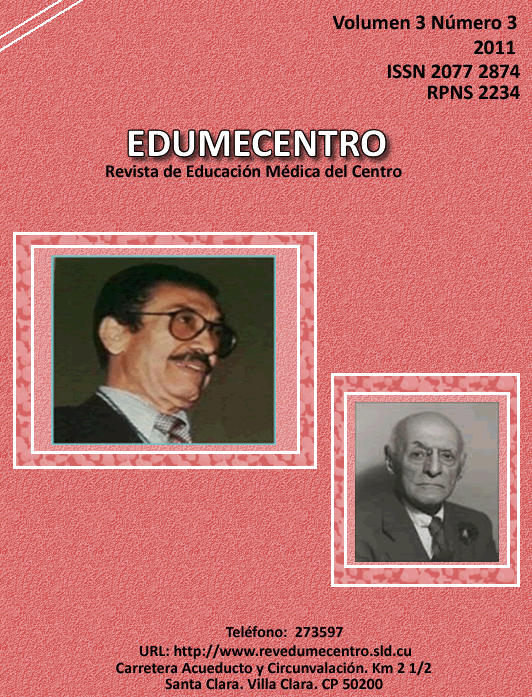Posicionamiento didáctico para el desarrollo de habilidades intelectuales en las ciencias básicas biomédicas
Palabras clave:
Didáctica, desarrollo de habilidades intelectuales, ciencias básicas biomédicas.Resumen
A fin de contribuir a una mejor orientación del trabajo didáctico para el desarrollo de habilidades intelectuales en estudiantes de Medicina, se recogieron criterios a 30 profesores cubanos con experiencia en la enseñanza de las ciencias básicas biomédicas de diferentes facultades; se indagó acerca de 15 habilidades intelectuales declaradas en los programas de estas ciencias. Se aplicaron procedimientos teóricos y empíricos pertinentes. Se identificaron 11 habilidades intelectuales con mayores nexos con los sistemas de conocimientos biomédicos básicos, organizadas según su complejidad a partir de la información ofrecida. Se concluyó que las más relacionadas con esos sistemas de conocimientos pueden trabajarse desde la práctica del proceso de enseñanza aprendizaje, mediante un posicionamiento didáctico con tres niveles de complejidad, a partir de las relaciones de coordinación y subordinación existentes entre ellas; y con una orientación desde lo sensoperceptual a lo racional como eje metodológico y gnoseológico principal para su desarrollo.Descargas
Los datos de descargas todavía no están disponibles.
Publicado
2013-02-13
Cómo citar
1.
Cañizares Luna O, Saraza Muñoz NL. Posicionamiento didáctico para el desarrollo de habilidades intelectuales en las ciencias básicas biomédicas. EDUMEC [Internet]. 13 de febrero de 2013 [citado 13 de febrero de 2026];3(3):30-5. Disponible en: https://revedumecentro.sld.cu/index.php/edumc/article/view/136
Número
Sección
ARTÍCULO ORIGINAL
Licencia
Los autores que publican en esta revista están de acuerdo con los siguientes términos:- Los autores/as conservarán sus derechos de autor y ceden a la revista el derecho de primera publicación de su obra, el cuál estará simultáneamente sujeto a una Licencia Creative Commons Reconocimiento-NoComercial-CompartirIgual 4.0 Internacional (CC BY-NC-SA 4.0) que permite a terceros compartir la obra siempre que se indique su autor y su primera publicación esta revista.
- Los autores pueden establecer por separado acuerdos adicionales para la distribución no exclusiva de la versión de la obra publicada en la revista (por ejemplo, situarlo en un repositorio institucional o publicarlo en un libro), con un reconocimiento de su publicación inicial en esta revista.
- Se permite y se anima a los autores a difundir sus trabajos electrónicamente (por ejemplo, en repositorios institucionales o en su propio sitio web) antes y durante el proceso de envío, ya que puede dar lugar a intercambios productivos, así como a una citación más temprana y mayor de los trabajos publicados (Véase The Effect of Open Access) (en inglés).









